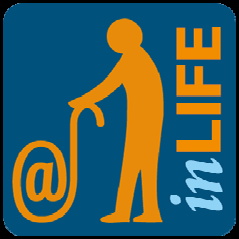IN LIFE
M. Gams, H. Gjoreski, J. Bizjak

IN LIFE – INdependent LIving support Functions for the Elderly-inLIFE
Short description, main aims and objectives of the project:
IN LIFE is a 36-month EU-funded project, bringing together leading experts of design and urban integration, transport operation and business, with local and regional authorities and end-users organizations, which represent the economic, demographic and territorial diversity of Europe.
The number of elderly living with cognitive impairment is growing rapidly due to increasing life expectancy. The percentage of those who live alone depends upon the condition (i.e. roughly 30% of those diagnosed with dementia) but the majority would like to live in their own home or with family, provided that it is safe, comfortable, and cost effective. IN LIFE aims to prolong and support independent living for elderly with cognitive impairments, through interoperable, open, personalised and seamless ICT services that support home activities, communication, health maintenance, travel, mobility and socialization, with novel, scalable and viable business models, based on feedback from large-scale, multi-country pilots. Building on existing knowledge and tested AAL technology/services IN LIFE will offer 19 different services, which will be further optimised and adapted to the particular needs and wants of various elderly groups, including mild cognitive impairment (MCI), early dementia and cognitive impairment with co morbid conditions, plus formal and informal caregivers. These interoperable services will be integrated into an open, cloud- based, reference architecture to be tested in 6 Europe-wide pilots in Greece, Netherlands, Slovenia, Spain, Sweden, and UK, with over 1200 elderly with cognitive impairments, 600 formal and informal caregivers, and 60 other stakeholders. Attention will be paid to issues concerning multilingual and multicultural environments. The project will establish and extensively test new business models for a new taxonomy of elderly with cognitive impairments, encompassing those that are clustered as “dependent”, “at risk”, “assisted” or “active” and formulating and accessing new business scenarios, such as the “user-centric”, “service provider-centric” and “data exploitation-centric” ones.
